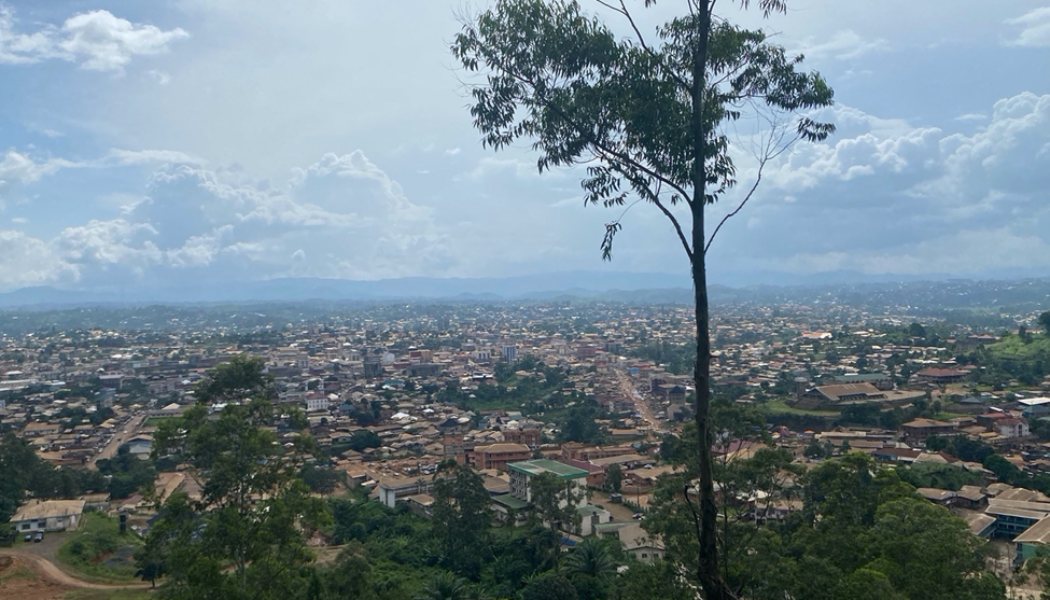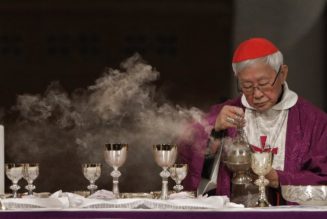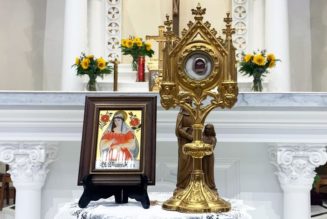BAMENDA, Cameroon — When Catholics across the world go to Eucharistic adoration, they typically pray for the health and well-being of their friends and families, an increase in virtue, and to know God’s will for their life.
The faithful in Bamenda, Cameroon, bring those same intentions to the Lord, too. But they also offer up another one: that the bloodshed around them might end.
The city of 600,000 is in the epicenter of the Central African nation’s ongoing civil war, a conflict that pits English-speaking separatists against the military of the Francophone-dominated government. Since the war started in 2017, it has ravaged Cameroon’s North West and South West regions, killing more than 6,000 people, mostly civilians, and displacing more than a million more.

Today in Bamenda, the northwest region’s capital, the “Anglophone crisis” is marked by the hallmarks of guerilla warfare. Uniformed military are spread throughout the city, while armed “Amba Boys,” the nickname for the separatists trying to establish the sovereign nation of Ambazonia, blend in with ordinary civilians. Hit-and-run killings conducted via motorcycle are common, as are kidnappings of civilians for ransom, indiscriminate and disproportionate military retaliations, and “ghost town” Mondays, when separatists enforce a lockdown that shutters schools and businesses — and leaving your house could get you beaten, abducted, or worse.

But the threat of violence hasn’t stopped Bamenda’s Catholics from coming to pray before Jesus in the Blessed Sacrament — even on “ghost town” days. In fact, multiple parishes tell the Register that with work and other activities restricted on Mondays, even more worshippers come to the adoration chapels than normal — despite facing harassment from the Amba Boys.
“They bother people, but the people still come,” Father Valentine Ndong, pastor of All Saints parish, told the Register. “You cannot stop them.”
Why do Bamenda’s Catholics endure potential violence to come to adoration? Because, as Paul Knimih, a catechist at All Saints who comes to the chapel in the evenings for his “alone time with Jesus,” puts it, “I know that it’s Jesus that can solve my problems, Jesus that can give me the courage to face my challenges.”

The fervor of Bamenda Catholics like Knimih shows how, if anything, Eucharistic adoration in the war-weary city has surged during the crisis, in large part due to the local archdiocese’s bold endeavor to make the devotion as widely available as possible.
Pastors report that their chapels have worshippers at every hour of the day and are often full in the hours before and after work. Not only Catholics, but Presbyterians, Baptists and even Pentecostals come, drawn by the presence of Christ in the Eucharist. And local Catholics tell the Register that while adoration is important no matter the circumstances, it’s needed even more right now in Bamenda.
“Especially in this time because there are so many corpses that they see, there is so much hatred thrown around, and they ask, ‘God, where are you?’” explained Father Lambert Etim, the parochial vicar of Immaculate Conception parish. “And in the sacrament of the Eucharist, the Bamenda man can actually find God in a certain still, calm way.”
Caroline Ngum, the chair of All Saints parish council, agreed, noting that “so many people are traumatized” by the crisis, “but when they come before Jesus, God shows them the way.” Andrew Mbuh has experienced this kind of rejuvenation in St. John the Baptist parish’s adoration chapel, spending quiet moments with the Blessed Sacrament.
“Sometimes you come here and you are so totally depressed,” he told the Register. “But when you leave, you are totally converted.”
Adoration Amid Unrest
Bamenda’s surge in adoration took off in November 2022, when Archbishop Andrew Nkea called upon each of the archdiocese’s 68 parishes to provide their faithful with a perpetual adoration chapel. The initiative was part of the archdiocese’s “Year of the Eucharist,” which also included Eucharistic processions and intense catechesis on the Blessed Sacrament.
The goal of the adoration chapel initiative, Archbishop Nkea wrote at the time, was “so that Christ’s Lay Faithful can have the opportunity to refresh themselves in the presence of their Lord and Master at any time of their convenience.”
Unwritten was the fact that by having adoration chapels in more of Bamenda’s neighborhoods, the faithful could pray before the Eucharist without having to travel across town to established chapels like the one at St. Joseph Cathedral — a welcome possibility in a city where driving after 6 p.m. can have deadly consequences. Additionally, Archbishop Nkea told the Register that the project was in part a response to some turning to “other powers” amid the conflict, such as soothsayers and witch doctors.

“It was an opportunity for us to refocus on Christ and the fact that the powers of this world are nothing compared to the power of Christ in the Eucharist when he is present among us,” said the Bamenda archbishop.
The parishes of Bamenda responded eagerly to their archbishop’s directive. In total, 11 new adoration chapels have already been constructed, while some of the archdiocese’s existing seven chapels have been renovated or expanded. Fifteen more perpetual adoration chapels are currently “in the pipeline,” said Msgr. Michael Kintang, a senior archdiocesan cleric who recently guided the Register around Bamenda.

“It takes time,” said the monsignor regarding the chapels’ construction, noting that the chapels are entirely funded by parishioners, who give generously despite the civil war’s financial impact, which includes limited economic activity, extortion and hefty ransoms.
Archbishop Nkea said that the cost to build a new chapel ranges from $30,000 to $50,000 — roughly three to five times greater than the average annual salary in Cameroon. But the archbishop says that when the idea was initially presented to parish councils around the archdiocese, they embraced it, “a very big sign of faith.”
Bamenda’s Catholics take pride in their adoration chapels, and no two are quite the same. Some are decorated with brightly colored flashing lights, others with gold leafing and elegant columns, while still others are stark and simple in appearance. Most new chapels were built from scratch, while some, like the garage-turned-chapel at St. Theresa “Little Way” parish, were converted from preexisting structures.
For locals, who try to live life normally but acknowledge being constantly “on edge” given the potential for sudden violence, Bamenda’s adoration chapels are a source of peace and refreshment. Their exteriors are often adorned with scriptural messages of stillness and refreshment — “Be still and know that I am God” or “Come to me, and I will give you rest” — and inside, paintings of idyllic nature scenes contribute to a restful environment for the weary.
Christ’s Healing Presence
But while Bamenda’s adoration chapels are a peaceful refuge, they’re also places of Christ’s presence amidst the suffering of his people — quite literally, given the chapels’ proximity to recent atrocities committed in the Cameroonian civil war.
Just three weeks ago, a Catholic high school across the street from the cathedral compound and its adoration chapel was shot up by separatists at the start of exams, injuring a student and a police officer; on April 4, Amba Boys left a severed head on the street a couple kilometers from St. Theresa “Little Way” parish and its garage-turned-chapel; and just down the road from the adoration chapel at the archdiocese’s under-construction Marian shrine, at a place called Nacho Junction, 10 civilians were killed in July 2023 by separatists who claimed their victims weren’t paying the “liberation tax” collected to fuel the fight for Ambazonia.

Clerics and religious workers in the war zone have also not gone unscathed. Priests have been routinely assaulted, abducted and tortured by both sides in the conflict, and in 2018 a seminarian was killed by the Cameroonian military in the Diocese of Mamfe, where Archbishop Nkea was then the ordinary.

The archbishop shared that he himself has been “detained” two times by the Amba Boys, most recently in 2023 on a pastoral visit to the remote town of Fanatui. His three-vehicle convoy was surrounded en route by 10 armed separatists, who led him into the bush at gun point and questioned him about recent statements he had made on the conflict. Two hours later, they released him, and he proceeded to the parish and celebrated a confirmation Mass. With so many wounds inflicted by the crisis, clergy and laity alike come to Bamenda’s adoration chapels seeking healing.

“Sometimes tears are just running, and you can’t control it; you just sit there in adoration,” shared Rose Barah of St. John the Baptist, who said she “runs” to adoration to be with God, who alone can console her.
Nian Nicolile experienced the loving presence of Christ in the Eucharist in the midst of unthinkable tragedy.

The young mother came to Bamenda in 2020 as an IDP, an internally displaced person, escaping even worse violence further west. The plan was for her younger brother to eventually join her. But just six months ago, Nicolile received devastating news: Her brother had been beaten to death — by the separatists or the army, she doesn’t know.
When she heard the news, she was overcome by desperation. But then she came to adoration at All Saints and says her heart was “touched by Christ.” “When I came and told Jesus what happened, I did not feel that pain,” she shared with the Register, outside the All Saints chapel that she voluntarily cleans. “When I came and stood in front of him, I talked to him, and everything passed. I just felt peace.”
‘Only Jesus Christ Will Help Us’
Bamenda’s Catholics don’t just receive personal consolation in adoration. They also receive the strength they need to share Christ’s love with others. And there are plenty of opportunities, from providing material aid to IDPs, to assisting fellow parishioners whose livelihoods were destroyed when the Amba Boys recently burned down a market, to comforting a mother whose son was beaten by the military in an indiscriminate response to a recent shooting.
Clergy like Father Etim spoke of their personal need to spend time in adoration “with the Priest himself par excellence, so that each day he gives me strength and even what to say” to his suffering parishioners. The adoration chapels are also places to pray for peace — which “Mama” Irene Kinyuy of St. John the Baptist believes has already made a difference.

“But for things like this,” she said, referring to the adoration chapel behind her where a Divine Mercy group prays every First Friday, “maybe this would have escalated into something worse.”
Archbishop Nkea has recently said that he believes calm is gradually returning to the Anglophone regions devastated by the conflict, which he has described as a crisis not over language, but culture and belonging. The president of the Cameroonian bishops’ conference has consistently said that peace must be established before justice can be given to Cameroon’s English-speaking minority, who have long complained of being treated as second-class citizens in their own country, which was formed in 1960 from two English- and French-ruled colonial territories.
Others are more skeptical that the conflict is calming and note that Cameroon’s civil war has become a cash cow for both the military and the separatists, some of whom are based in the United States and profit off of ransoms.
Whether the war ends or endures, Bamenda’s Catholics know that Eucharistic adoration will be at the heart of the Church’s response — and bristle at the suggestion that prayer is a distraction from practical solutions to the war. “We cannot in anyway relegate God into the background because of the crisis,” said Father Cyprien Diang, pastor of St. John the Baptist. “I can ensure you that when you see a bit of life here, it is because of the Church. It is because of the prayers we are making.”

Archbishop Nkea continues to be actively involved in efforts of national religious leaders to mediate the conflict, which he said he could not discuss publicly for the sake of ensuring their efficiency. Regarding the dialogue, which is reaching out to both separatists and the government, he said that “by the grace of God, we are getting somewhere.” But Bamenda’s archbishop underscored that no one should “underestimate the power of Christ to bring a solution to this conflict.”
“At the place where we are now, human intelligence has failed us,” he told the Register. “Both parties involved in the conflict are in a deadlock in this situation. Only prayer, only Jesus Christ will help us.” Nicolile, the woman whose brother was killed in the conflict, hopes those still engaged in violence in Bamenda have a chance to experience the peace of praying before the Blessed Sacrament for themselves.
“They would be touched by Christ. The more they pray, the better.”









